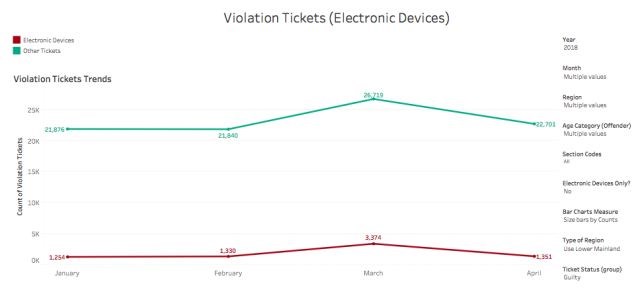The number of distracted driving tickets issued in B.C. has steadily fallen for the past three years, possibly because drivers are getting craftier when using their electronics.
According to data from the Insurance Corp. of B.C., between 2010 and 2016 police handed out more than 300,000 tickets for distracted driving, that includes using an electronic device and emailing or texting while driving. Of those alleged violations, just over 280,000 resulted in convictions.
In 2010, 21,300 tickets were processed, rising to a high of 54,800 in 2014. Since then, the number of tickets has decreased, to 49,300 in 2015 and 42,700 in 2016.
During the first four months of 2018, 7,309 distracted driving tickets resulted in convictions - almost 6,000 fewer than the same period last year.
The reasons behind the drop in distracted driving tickets - part of an overall decrease in the number of traffic tickets being issued - are not clear according to Mark Milner, program manager for ICBC's road safety department.
"It doesn't seem to be that people are using their phones less behind the wheel. We certainly haven't seen that reflected in distracted-driving-related crashes yet, and we don't really see it reflected in our survey data either," said Milner.
"While we see a fairly small, incremental improvement over time, we haven't seen any kind of drops like we're seeing in the ticketing. It could be just that people are getting better at hiding what they're doing."
Penalties have risen for first-time and repeat offenders. The fine for using an electronic device, emailing or texting while driving is $368 and four driver penalty points. As of March 1, drivers with two convictions for using an electronic device while driving over a three-year period could pay as much as $2,000 on top of their regular car insurance premium.
There are fewer repeat offenders thanks to the new penalties - among the highest in Canada - but Milner said it doesn't necessarily account for the drop in tickets.
"It's tough to nab people, that's for sure, because people that are committing that offence are fairly crafty at trying to avoid being seen," said Const. Mike Halskov, with the B.C. RCMP's E Division Traffic Services. "We have to resort to different methods to try to observe the offence so we can write the tickets."
Police have cracked down on distracted drivers using new high-tech equipment and enforcement blitzes both province wide and locally, and ICBC has education programs and advertising to discourage distracted driving.
ICBC also recently finished a pilot project that involved testers using devices that blocked certain functions on their phones while driving.
Halskov said police have to resort to creative means to enforce the offences associated with using a device while driving.
"It's not anywhere as easy as a speeding ticket because you have to catch them in the act. You have to be up close and personal to see what's going on," he said. "I'm sure a lot of people are getting away with it."
Vancouver driving lawyer Paul Doroshenko said another issue is that police aren't as focused on enforcement when it comes to distracted driving, something he's gleaned from his conversations with police officers.
"We just noticed enforcement is way down - they just don't want to put money into it," Doroshenko said. "I think it's got a lot to do with resource allocation and what is the important thing of the week."
He said officers have also told him that they aren't seeing a reduction in electronic device use, that people simply put their phones away when they see police.
Doroshenko has heard stories of people hiding phones in their scarves or hats to avoid detection.
"It's just so common. I don't think it's changed any behaviour except people are getting better at hiding it," he said.
Halskov disagreed that there is less enforcement by fewer police officers.
"We are out there regularly issuing tickets for that offence," he said.
Despite that, he said using electronic devices while driving is prevalent, and he sees it often while he's off duty and driving his personal vehicle.
"It's frustrating. They're only putting themselves and other people in danger by engaging in that behaviour while they're driving," Halskov said. "Driving is a complicated enough task without adding to the risks by engaging in that behaviour."
According to ICBC stats, from 2012 to 2016, there was an average of 78 traffic fatalities per year in B.C. where distraction - including use of communication or video equipment, driver inattention and driver distraction - was a contributing factor.
The B.C. Coroners Service also keeps track of what factors contribute to motor vehicle fatalities in B.C., but has linked far fewer deaths to confirmed or suspected electronic device use - just 14 between September 2010 and November 2015, according to a freedom of information request filed by Doroshenko.
The discrepancy is likely due to the fact that the methods used by police and coroners in determining contributing factors are different.
The bottom line, Milner said, is that ICBC and police don't want to see people putting themselves and others in unnecessary danger by using electronic devices.
"It causes a lot of crashes, and those crashes cause a lot of injuries and an unfortunate number of fatalities as well," he said.
"If people can stay focused on driving, if they can prevent themselves from becoming distracted, then they have better chance of not being involved in a crash ... and I think that makes for a better situation for everybody."


